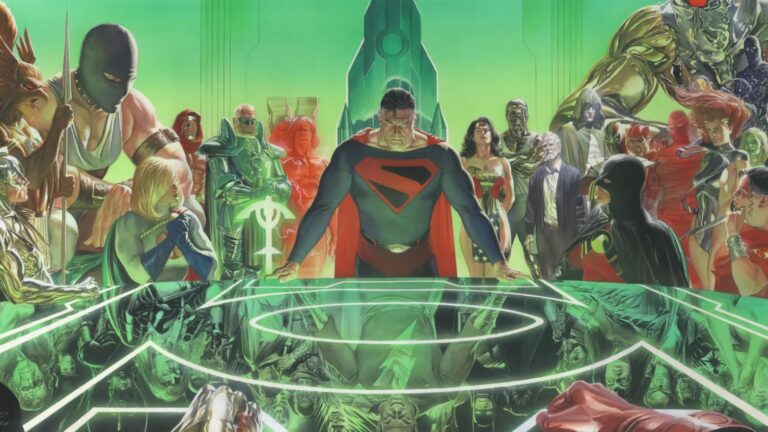Gabriel Nieve
I don’t care what the history books say: The biggest event of 1996 wasn’t Bill Clinton’s reelection or the premiere of the classic movie “Independence Day.” It was the release of all four volumes of Mark Waid and Alex Ross’ DC Comics series, “Kingdom Come.”
On Saturday, at San Diego Comic-Con 2024, Waid appeared alongside key members of the team making the Kingdom Come documentary during the “The Legend of Kingdom Come: Documentary Preview” panel. Moderated by The Wrap’s Mike Rowe, Waid was joined by director Lemsey Atassi, producer Sal Abinanti, and Arrowverse writers Shauna Benson and Julie Benson.
Law began the panel with a preview of the upcoming documentary, which will see comics greats like Brian Pulido, Gene Ha, and Todd McFarlane, as well as Waid and Ross, being interviewed about Kingdom Come.
At Law’s urging, Waid began to tell the story of Kingdom Come’s origins: Artist Alex Ross had just finished a Marvels series with writer Kurt Busiek and came to DC Comics with some ideas and sketches, telling them he only wanted to work with writers who knew DC well.
Enter Waid. Waid knew so much more about the DC mythos, including the names of each member of the Kryptonian Science Council. Waid is also said to know Clark Kent’s social security number. While this information may be available with a quick Google search now, it wasn’t easily accessible in the mid-90s.
Waid and Ross met over a very informative lunch, followed by a weekend in Ross’ hometown of Chicago to work out the story. Through these meetings, Waid found a way to “get into” Superman in the series’ final scene, where Superman dons Clark Kent’s glasses, regaining his humanity in the process.
During the production of Kingdom Come, Waid received drawings via fax from Ross, who sent him an average of ten pages of drawings per month.
Legend of Kingdom Come producer Abinati (creator of Atomica) was involved in the making of Kingdom Come almost from the beginning. Abinati was a young creative in Chicago who says he was lucky to have Ross around at the time. One day, Ross asked Abinati to model for him, and he was a little apprehensive but agreed because… well, it was weird. It got even weirder when Ross gave him a Captain Marvel costume (possibly made by Paul Dini) to wear during the sessions.
Avinati soon learned that Ross had been using the model to create reference photos for his character designs in Kingdom Come; Avinati was the reference for Captain Marvel. He described the unwanted fame he gained from this association as “horrible.” His friends teased him about the resemblance, but as the series aired, Kingdom Come fans began approaching him for autographs, including superhero fans of the Fawcett family, who would often congratulate him when they found out he was Captain Marvel. Would he do it again? That is, if Ross could dress him in a better costume.
Returning from our digression, documentary director Atasi spoke about conducting over 30 interviews and being given access to archival materials related to Kingdom Come, including some of Ross’ childhood sketches of DC heroes that appear in the trailer above.
“Kingdom Come is very cinematic,” says Arrowverse writer Shauna Benson. Before the superhero boom of the 2000s, there weren’t many good superhero movies. There was the 1978 Superman and Tim Burton’s Batman movies, but nothing like the modern offerings. Benson says Kingdom Come is “really, really well made,” especially for the ’90s.
Law then asked why the story was still around, and Waid explained his thoughts on Superman’s motivations and why he quit. That’s where the character Magog came from. Magog is a stand-in for the “Grimdark” ultra-violent characters that were popular in the early to mid-90s. Waid and Law went on to discuss how Superman seems to be building concentration camps in Kingdom Come, how Batman turned Gotham into a police state in the series, and more. No one is completely right in the story.
“The fascism of Superman is more visible now than it was 30 years ago,” Waid said. Waid then admitted that he’d been bluffing for the past few minutes, unable to precisely answer Law’s question about the story’s continuing relevance.
Waid said DC had one mandate at the time: Superman had to have a mullet, at least for scenes set in the “present day” (Kingdom Come is set in the future), and Waid followed through, even though it went against his belief in creating an essential, classic version of the character.
It’s impossible to talk about Kingdom Come without mentioning the incredible art of Alex Ross. Among the many people who were used as inspiration for characters, the panel paid special attention to Ross’s father, who was the inspiration for Kingdom Come’s narrator, Norman MacKay. This was especially poignant, as Ross’s father passed away during the making of the documentary.
Law then asked more about Ross and his involvement with the documentary. Ross is notoriously reluctant to give interviews. Abinati said it wasn’t as much of an issue as people might think. “Kingdom Come is Alex’s treasure.” Ross was happy to talk about the book.
Waid also spoke about Ross’ love for characters from the Golden and Silver Age of comics: “We could discuss Martian Manhunter for 30 minutes, and we did!”
Law then pointed out that the shield in Kingdom Come: Superman appears to be the one that will appear in James Gunn’s upcoming Superman film in 2025. Waid said he is aware of this and “trusts James Gunn 110%.”
To conclude the main part of the panel, Lo showed a clip detailing the early outlining work for Kingdom Come, after which he opened the Q&A session.
Q: “What would it take to bring Alex Ross back to DC?”
Wide: “If we’re lucky, we might be able to cover it.”
Q: “If you were to do Kingdom Come now, what DC characters would you use?”
Wide: “Jon Kent, son of Superman.”
Q: “If you were to write a Superman biography, which canon events from Superman’s life (events important to the character, inspired by the Spider-Verse movies) would you (Wide) use?”
Wide: “I love the Grant Morrison version of ‘It All Happened’…except for the mullet.”
One thing Waid couldn’t accept was that “Superman has never killed anyone,” which drew the loudest applause from the panelists.
One of the final questions was about the “needle in a haystack” cameos that characterize Kingdom Come (Beppo the Supermonkey, The Beatles, The Monkees, etc.). Waid noted that unless a cameo was specifically scripted by Roth, they were all the work of Roth. Waid concluded on the subject by saying, “This is not a story about a soldier, it’s a story about a general.”
The Legend of Kingdom Come will be available on Kickstarter this fall. Sign up here to receive updates.
Stay tuned for more coverage from SDCC ’24 from The Beat.
Like this:
Like Loading…


